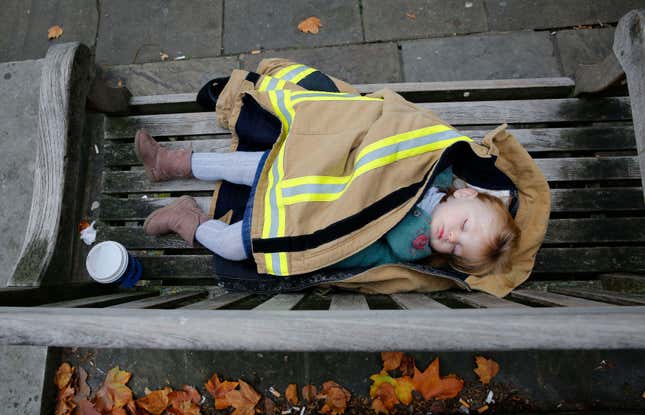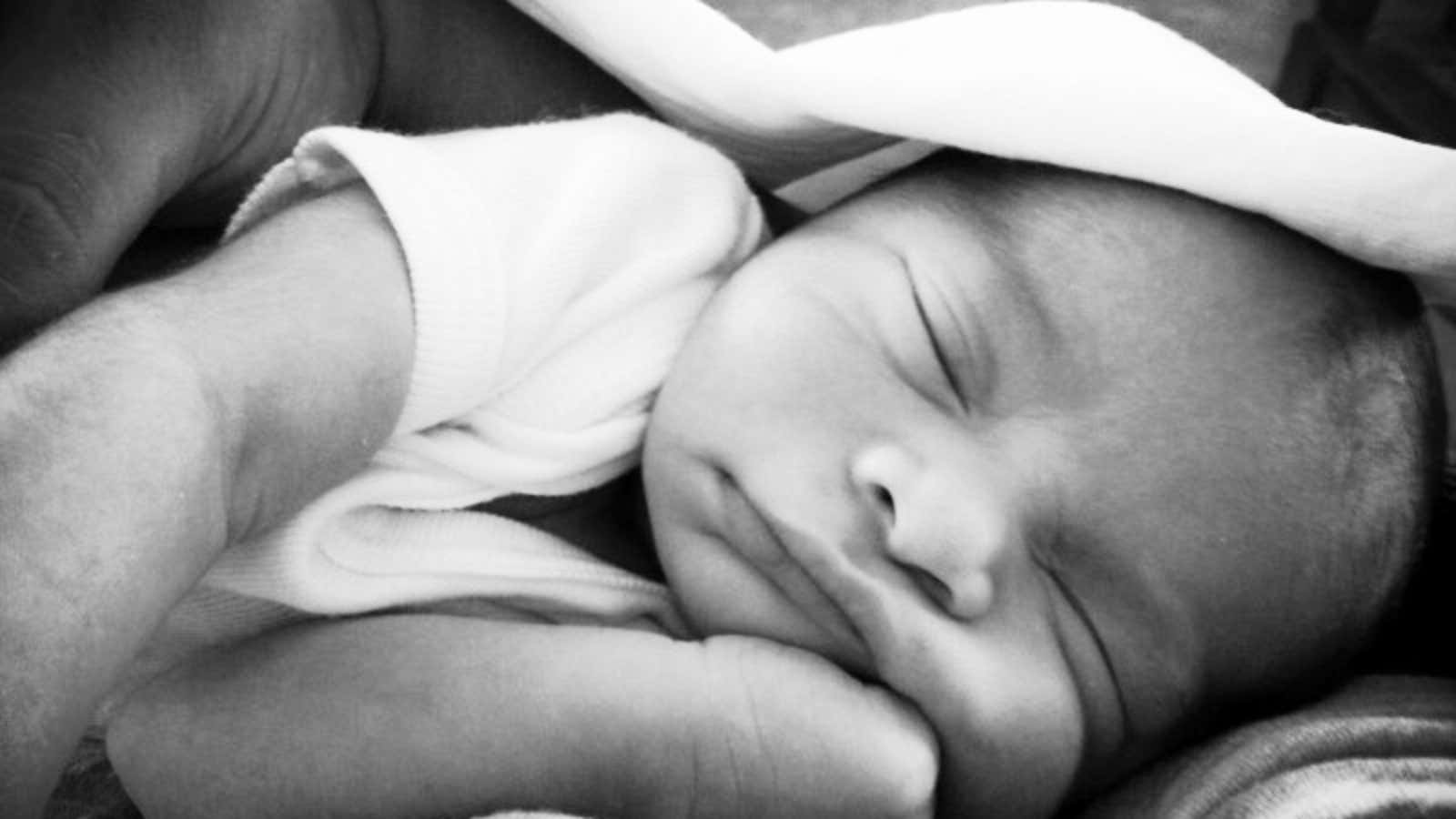Parenting in the information age can be maddening. Data and opinions are everywhere, but helpful advice often feels in short supply. In our Mom and Scientist series, Jenny Anderson, a journalist and mother of two, and Akshat Rathi, a scientist, tackle challenging topics by balancing complex science against real-life experience.
AKSHAT
Let’s start with the basics: sleep plays a critical role in early development of a child. Those who sleep poorly under the age of three have lower cognitive scores when they grow up.
Babies and kids need lots of sleep: 14-17 hours for newborns under three months, 12-15 hours for infants under a year, and 11-14 hours for toddlers. Also, infant sleep problems double the risk of maternal depression symptoms. So getting your kid to sleep as much as possible is important.
JENNY
And sleep is important for the parents too. Ask any new mom. So should I sleep train my kid? If so, when? And what are the potential long-term costs and benefits?
AKSHAT
This long-term randomized-control study—which is the gold standard of evidence in medicine—is pretty telling. The first part of the study looked at some 300 infants at seven months whose parents reported that their kid’s sleep had been a problem for them. One group was given one of two behavioral interventions: “controlled comforting,” where parents respond to a child’s cry at increasing time intervals, or “camping out” where parents sit with the child till he learns to fall asleep independently. The other group received no intervention.
At about three years of age, the kids who were sleep trained reported fewer sleep problems, and the mothers less maternal depression. Then, they checked in five years later and found there were no “long-lasting harmful or beneficial effects on child, child-parent, or maternal outcomes” for the sleep-trained kids. That includes on measures such as emotional well-being, behavior, sleep problems, sleep habits, parent-child relationship and closeness, conflict, and parental depression and anxiety.
So, at this stage, the control group was sleeping just as well as the intervention group. That means time heals everything, though presumably the parents who sleep trained their kids would have logged more rest than the control group.
And the researchers were so convinced of their findings that they concluded it would be unethical to run future long-term trials because the control group would be deprived of a proven beneficial intervention.
Though this is one of the best studies measuring the effectiveness of sleep-training, it had some limitations. In the second part of the study, the researchers could only get half the kids in the study to provide all the needed data. The sample was also skewed toward well-educated parents. It also left out one of the most common methods of sleep-training: crying-it-out.
JENNY
We sleep trained my first daughter at six months by letting her cry-it-out, because we wanted to impose order on the anarchy of my exhausting new life. But it wasn’t easy. I couldn’t bear to hear her wailing in the middle of the night. So I left the house and stayed with a friend for three nights. I knew my husband would make sure she was okay, but I also knew he would be fine letting her cry (he did not lactate at the sound of her cries: biology matters). Three nights later, she was sleep trained and slept 12-13 hours a night, every night, putting herself to sleep at 7:30pm pronto. It was dreamy.

When my second came along, I planned to sleep train her at four months. But she got a respiratory illness at two months and our doctor recommended she sleep upright, next to us, to ensure that she was breathing. After that, she got sick every 2-3 weeks until she was almost three. When she cried at night we weren’t sure whether it was because she had coughed so much she had vomited—a regular occurrence—or because she wanted attention. She slept with us a lot, and did not sleep properly through the night until she was three.
Life gets in the way of good plans. Sleep training works and, in my opinion, the long-term benefits (my sanity, my kid’s amazing mood in the morning, knowing she is getting her rest) far outweigh a few nights of pain.
What do scientists have to say about crying-it-out?
AKSHAT
Sarah Blunden of the Australian Center for Education in Sleep says, “Not only are [the parents] ignoring their infant’s cries, they may be ignoring the invitation to develop a shared basis of communication and understanding at that moment,” she says. She blames a lot of things on the ”unnatural” desire to have our kids sleep alone, from the Western work ethic to the sexualization of the parental bed. It’s pretty damning stuff.
JENNY
That’s too harsh. I respect parents who don’t want to let their kids cry it out, but let’s not leap to the conclusion we are emotionally damaging them. Children cry for all kinds of reasons, especially when they’re mad and want stuff we know isn’t good for them. Parents choose to ignore those cries all the time, especially when we know it will be good for them in the long-run (say, after a good night sleep).
AKSHAT
Avi Sadeh of Tel Aviv University says parents aren’t just being selfish in wanting their kids to sleep: we want our kids to sleep because sleep is good for them. “Even if we consider the scientific literature from the ‘egocentric’ perspective of the infant, it is certainly in the best interests of the infant to have healthy, well-rested and ultimately more responsive parents,” he says.
JENNY
Amen to that. Also, let’s be clear: plenty of pediatricians are more than happy to recommend crying-it-out. Marc Weisbluth recommends to check on them to make sure they are ok; reassure them; then leave, and pour a stiff Bourbon (that’s my addition).
AKSHAT
So did you notice any difference in how your kids turned out? It’s a sample size of two, but I am curious.
JENNY
My sleep-trained kid is less affectionate than the one that ended up in our bed. But I think that’s her constitution, not the effect of her sleep training. The sleep-trained one is much more outgoing, and open to others than her sister. She also ate a lot of avocados. Who knows what causes what.
I’ve polled a lot of moms and the ones who sleep trained their kids, by whatever method they chose, were happy they did it. Do not underestimate the relationship between a well-rested parent and a parent who is able to cope with the myriad things babies and kids throw at you all day (literally, sometimes).
There’s also a trend with sleep training among moms I polled: uncertainty and panic with the first kid, and resignation by numbers two, three and four. Almost all of those end up in their bed. “It’s just about getting through it,” said one mom who just had her third. So whatever you do, it’s probably not what you will do again, and the fact that you are reading this column—you are an involved and curious (or desperate) parent—means your kid will be fine.
AKSHAT
The science seems solid here. The American Academy of Sleep Medicine released a “standards of practice” guidelines (pdf) to deal with sleep issues. It reviewed 52 treatment studies: 94% reported that behavioral interventions were effective, and 80% of children treated demonstrated clinically significant improvement.
One piece of advice that pediatricians often given parents is to develop a bedtime routine, especially for those children who have difficulty falling asleep. Science backs up the intuitive idea. In a unique 2009 study that isolated the effect of bedtime routines from the many factors that affect infant sleep, researchers showed that infants and toddlers who were exposed to bedtime routines via a two-week intervention reduced night wakings by more than 50%, increased continuous sleep dramatically, and reported far fewer sleep problems. They did not sleep dramatically more: they went down more easily, stayed asleep for longer periods of time, and called out for their parents less.
JENNY
I would call that an unmitigated victory. So what’s a new parent to do with all this? Here are a few scientifically-informed tips:
Routines are golden: Kids love predictability. But no infant, or toddler, will ever ask to be put to bed. They don’t know they need it: you do. You are the parent. Develop your routines—dinner, bath, stories, lullabies—and stick to it. Every night—even if you just arrived on a long-haul flight from Australia (they need it most then). Kids love and respond to this architecture.
Sleep begets sleep: If you set up a routine and nail it before the kid gets too tired, you are in better shape than when you have an overtired, overwrought mess on your hands. Get your kids to bed early: you will be shocked how much they need the sleep, and the freedom it affords you.
Pick a method and stick to it: One surely resonates more than the other. Reading 100 books will lead you to conclude that the world is ending and your baby will die if she is not sleeping 23 hours a night.
And remember, it really is a phase. No matter how tired you are now, you won’t be this tired forever. As one mom said, “This consumed my life for five years, and now I barely remember it all.” And her three kids are all sleeping very well.
